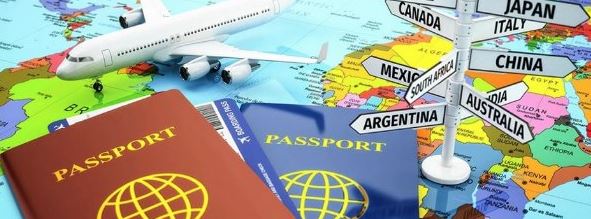strong>International Tourism

International tourism refers to tourism that crosses national borders. Globalization has made tourism a popular global leisure activity. The World Tourism Organization defines tourists as people "traveling to and staying in places outside their usual environment for not more than one consecutive year for leisure, business and other purposes". The World Health Organization (WHO) estimates that up to 500,000 people are in flight at any one time.
The international tourism COVID-19 crisis
In 2010, international tourism reached US$919B, growing 6.5% over 2009, corresponding to an increase in real terms of 4.7%. In 2010, there were over 940 million international tourist arrivals worldwide. By 2016 that number had risen to 1,235 million, producing 1,220 billion USD in destination spending. The COVID-19 crisis had significant negative effects on international tourism significantly slowing the overall increasing trend.
Tourism numbers in 2000s recession
Tourism numbers declined as a result of a strong economic slowdown (the late-2000s recession) between the second half of 2008 and the end of 2009, and in consequence of the outbreak of the 2009 H1N1 influenza virus, but slowly recovered until the COVID-19 pandemic put an abrupt end to the growth. The United Nations World Tourism Organization estimated that global international tourist arrivals might decrease by 58% to 78% in 2020, leading to a potential loss of US$0.9–1.2 trillion in international tourism receipts.
International tourism has significant impacts on the environment, exacerbated in part by the problems created by air travel but also by other issues, including wealthy tourists bringing lifestyles that stress local infrastructure, water and trash systems among others.
International Tourism Basis
The economic foundations of tourism are essentially the cultural assets, the cultural property and the nature of the travel location. The World Heritage Sites are particularly worth mentioning today because they are real tourism magnets. But even a country's current or former form of government can be decisive for tourism. For example, the fascination of the British royal family brings millions of tourists to Great Britain every year and thus the economy around £550 million a year. The Habsburg family can be mentioned in Central Europe. According to estimates, the Habsburg brand should generate tourism sales of 60 million euros per year for Vienna alone. The tourist principle "Habsburg sells" applies.
ignificant negative effects on international tourism
The COVID-19 pandemic has a huge impact on the tourism industry due to the resulting travel restrictions as well as slump in demand among travelers. The tourism industry has been massively affected by the spread of coronavirus, as many countries have introduced travel restrictions in an attempt to contain its spread. The United Nations World Tourism Organization estimated that global international tourist arrivals might decrease by 58% to 78% in 2020, leading to a potential loss of US$0.9–1.2 trillion in international tourism receipts.
In many of the world's cities, planned travel went down by 80–90%. Conflicting and unilateral travel restrictions occurred regionally and many tourist attractions around the world, such as museums, amusement parks, and sports venues closed. UNWTO reported a 65% drop in international tourist arrivals in the first six months of 2020. Air passenger travel showed a similar decline.
Definitions Tourism

In 1936, the League of Nations defined a foreign tourist as "someone traveling abroad for at least twenty-four hours". Its successor, the United Nations, amended this definition in 1945, by including a maximum stay of six months
In 1941, Hunziker and Kraft defined tourism as "the sum of the phenomena and relationships arising from the travel and stay of non-residents, insofar as they do not lead to permanent residence and are not connected with any earning activity." In 1976, the Tourism Society of England's definition was: "Tourism is the temporary, short-term movement of people to destinations outside the places where they normally live and work and their activities during the stay at each destination. It includes movements for all purposes." In 1981, the International Association of Scientific Experts in Tourism defined tourism in terms of particular activities chosen and undertaken outside the home.
- Domestic tourism, involving residents of the given country traveling only within this country
- Inbound tourism, involving non-residents traveling in the given country
- Outbound tourism, involving residents traveling in another country
In 1994, the United Nations identified three forms of tourism in its Recommendations on Tourism Statistics:
- National Tourism: It is a combination of domestic and outbound tourism
- Regional Tourism: It is a combination of domestic and inbound tourism
- International Tourism: It is a combination of inbound and outbound tourism
Other groupings derived from the above grouping:
The terms tourism and travel are sometimes used interchangeably. In this context, travel has a similar definition to tourism but implies a more purposeful journey. The terms tourism and tourist are sometimes used pejoratively, to imply a shallow interest in the cultures or locations visited. By contrast, traveler is often used as a sign of distinction. The sociology of tourism has studied the cultural values underpinning these distinctions and their implications for class relationsç